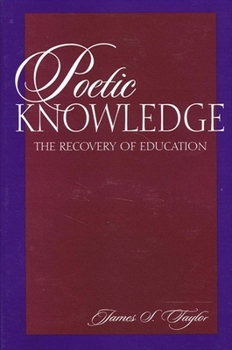Poetic Knowledge: The Recovery of Education
Select Format
Select Condition 
Book Overview
Reveals the neglected mode of knowing and learning, from Socrates to the middle ages and beyond, that relies more on the integrated powers of sensory experience and intuition, rather than on modern narrow scientific models of education.
Format:Paperback
Language:English
ISBN:0791435865
ISBN13:9780791435861
Release Date:December 1997
Publisher:State University of New York Press
Length:220 Pages
Weight:0.85 lbs.
Dimensions:0.6" x 6.2" x 8.9"
Customer Reviews
3 ratings
Twinkle twinkle little star
Published by Thriftbooks.com User , 20 years ago
O Lord our Lord, how admirable is thy name in all the earth! My heart leaps up when I behold A rainbow in the sky. Twinkle, twinkle little star, How I wonder what you are. Awe. Admiration. Amazement. Marvel. Delight. The Psalmist, the poet Wordsworth, the child who looks up at the night sky and lisps the nursery rhyme, all speak of that passion of wonder which Aristotle taught is the beginning of philosophy. It is something we have all experienced in seeing a thunder storm roll in on a spring day, looking at the sun set afterwards, or watching a quarter horse race across a pasture, its muscles rippling in the light. The immediate, direct apprehension of reality that inspires wonder and awe is called by the ancients poetica scientia, poetic knowledge. It is this neglected, even distrusted way of knowing that is the subject of Poetic Knowledge, a book published in 1998 by the State University of New York Press.The author, Dr James Taylor, explains that poetic knowledge is not merely a knowledge of poetry, "but rather a poetic experience of reality." He writes: "Poetic experience indicates an encounter with reality that is non-analytical, something that is perceived as beautiful, awful (awe-full), spontaneous, mysterious. . . . Poetic knowledge is a spontaneous act of the external and internal senses with the intellect, integrated and whole, rather than an act associated with the powers of analytic reasoning. . . . It is, we might say, knowledge from the inside out, radically different from a knowledge about things. In other words, it is the opposite of scientific knowledge."If this passage seems like heavy going, abstract and difficult, it must be said straight away that it is, and that it is not the only one. The author has made an exhaustive study both of what poetic knowledge is, using the language and categories of scholastic philosophy, and of its history from ancient Greece through the Middle Ages down to its deformation since the time of Descartes in the 17th century. However, the book is not only or principally a philosophical treatise, of interest solely to academics. Consider these passages: "When Wordsworth writes `My heart leaps up when I behold / A rainbow in the sky' . . . , something of the rainbow's reality is truly known, but rational explanation alone is insufficient, in fact impossible, for this is the gaze of contemplation, of love. It is the difference between being unexpectedly moved by an unknown attractive face--desiring to know the person better--and the desperate premeditation of computer dating."Knowledge at the poetic level considers neither ends nor means. . . . For example, in the case of furniture there are chairs and tables placed together in such a way that we may sit and have a meal. Sometimes we consider these things in themselves apart from any purpose as in the case of their beauty: a Shaker-style chair, for example, set on a polished wood-plank floor, against a white-washed wall with the sunlight from a ba
From Volume 40 (2000) of "The University Bookman"
Published by Thriftbooks.com User , 20 years ago
"Poetic Knowledge skillfully excavates an essential mode of human knowledge. It is a mode as proper to our intelligence as it is redolent of man's transcendence and the value of knowledge for its own sake. Until we understand the philosophical rigor and precision behind the following statement, our darkened era will persist in its educational malaise: '[T]here can be no real advancement of knowledge unless it first begin in leisure and wonder, where the controlling motive throughout [is] delight and love.'"--David Whalen, Hillsdale College
From the back cover of Poetic Knowledge
Published by Thriftbooks.com User , 21 years ago
"There are relatively few persons who can analyze as clearly and as lucidly the writings of Aristotle, Plato, and Acquinas as does this author. Like Taylor's educational philosophy, he seeks to move his readers' affections and will as well as their intellects, and he does this successfully." -- Richard Harp, University of NevadaThis book rediscovers a traditional mode of knowledge that remains viable today. Contrasted to the academic and cultural fads often based on the scientific methodology of the Cartesian legacy, or any number of trendy experiments in education, Poetic Knowledge returns to the freshness and importance of first knowledge, a knowledge of the senses and the passions."Poetic knowledge" is not the knowledge of poetry, nor is it even knowledge in the sense that we often think of today, that is, the mastery of scientific, technological, or business information. Rather, it is an intuitive, obscure, mysterious way of knowing reality, not always able to account for itself, but absolutely essential if one is ever to advance properly to the higher degrees of certainty. From Socrates to the Middle Ages, and even into the twentieth century, the case for poetic knowledge is revealed with the care of philosophical archeology. Taylor demonstrates the effectiveness of the poetic mode of education through his own observations as a teacher, and two experimental "poetic" schools in the twentieth century."With pithy brevity he has managed to provide both a history of the treatment of poetic knowledge and to develop his own very persuasive account." -- Ralph McInerny, University of Notre Dame





